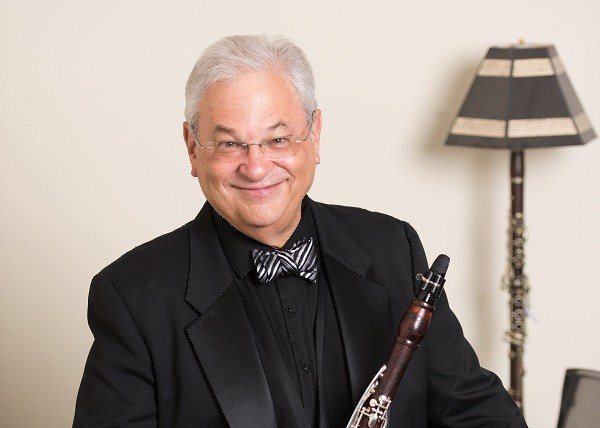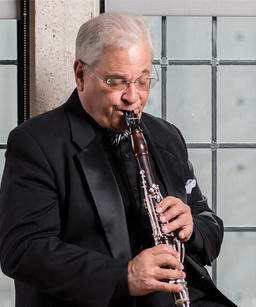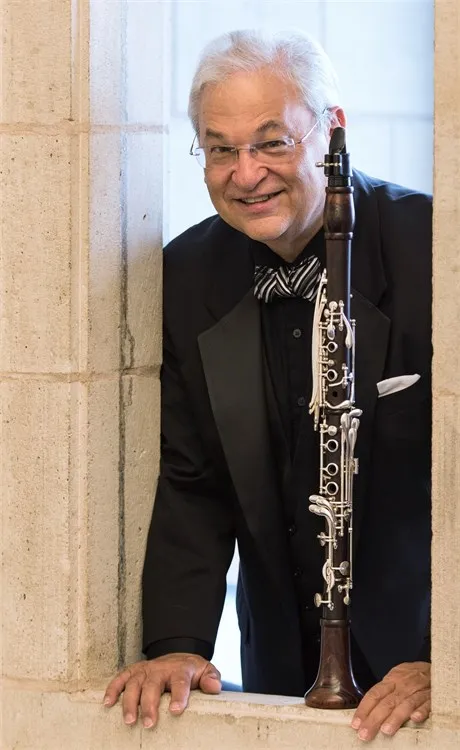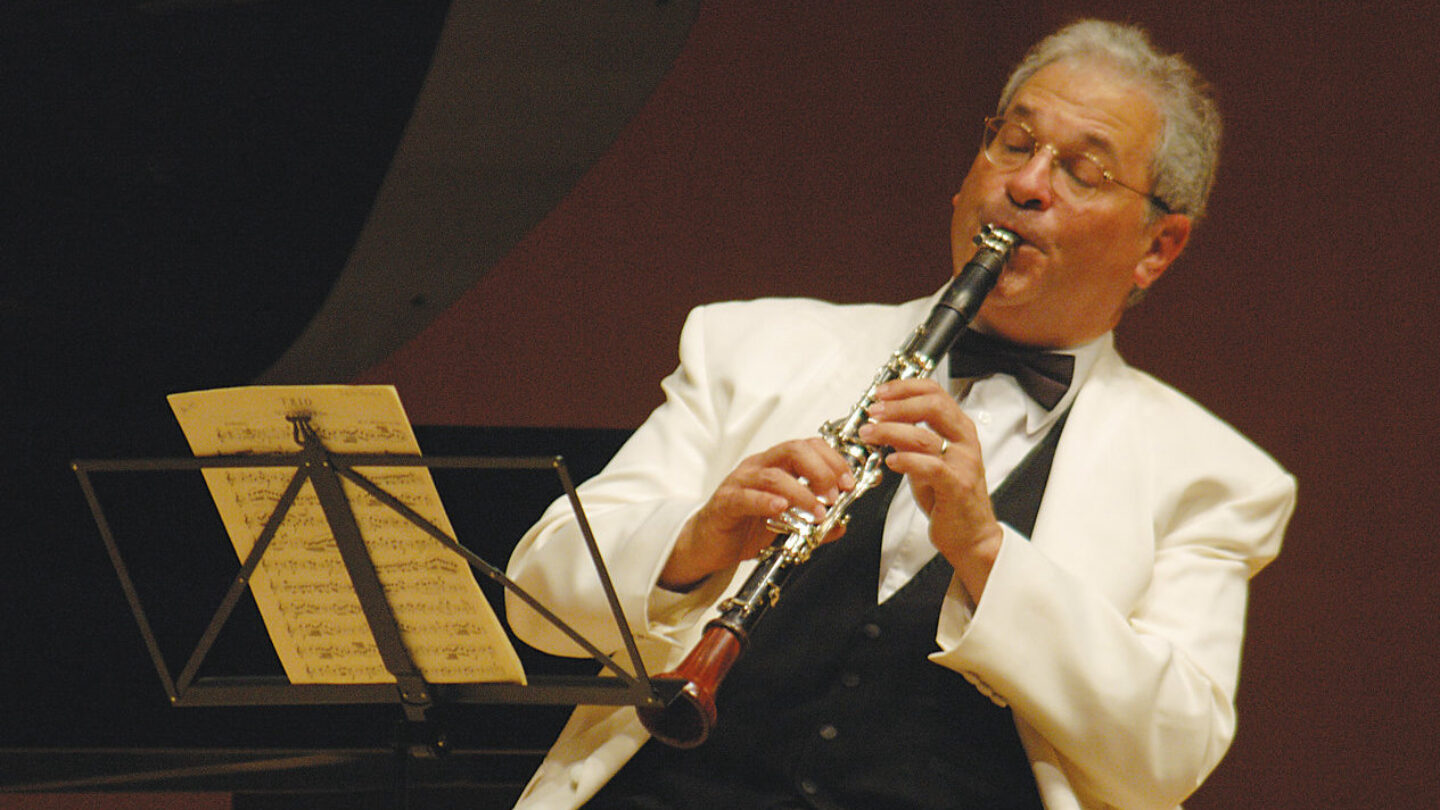
Today, we have the distinct honor of sitting down with David Shifrin, our esteemed principal clarinetist. On March 17 at Woolsey Hall, he will be our featured soloist on Mozart’s Clarinet Concerto. (Click here to learn more about that program and to purchase tickets.)
What New Haven Symphony Orchestra fans may not realize is that our Principal Clarinetist is one of the most sought-after clarinetists in the world.
A name synonymous with musical excellence, Mr. Shifrin boasts a career spanning decades, with accolades including the coveted Avery Fisher Prize and three (!) Grammy nominations.
His awards and honors include Chamber Music Society of Lincoln Center’s Award for Extraordinary Service to Chamber Music, a Solo Recitalists’ Fellowship from the National Endowment for the Arts, Music Academy of the West’s Distinguished Alumnus Award, and top prizes at the Munich and Geneva International Competitions, just to name a few!
Mr. Shifrin performing Mozart’s Clarinet Concerto with the Amadeus Chamber Orchestra in January 2020. He will play this piece with the New Haven Symphony Orchestra on March 17, 2024 at Woolsey Hall. Learn More…
Beyond his masterful performances, Mr. Shifrin is a dedicated chamber musician, educator, and artistic director, shaping the landscape of classical music through his multifaceted involvement. He serves on the faculty of the Yale School of Music, and has previously taught at the Juilliard School, University of Southern California, University of Michigan, Cleveland Institute of Music and the University of Hawaii.
In this exclusive Q&A, we delve into Mr. Shifrin’s captivating journey, exploring his artistic inspirations, his experiences with the New Haven Symphony, and his unique perspective on the ever-evolving world of music.
Get ready to be inspired, informed, and perhaps even discover a newfound appreciation for the magic of the clarinet!
Clarinet 101
We wanted to start out by asking you a few questions that we get asked regularly about the clarinet. It is such an important instrument in orchestras!
So let’s start from the beginning. When was the clarinet invented and by whom?
That’s an interesting question because the clarinet kind of evolved from an earlier instrument called the chalumeau which basically involved a mouthpiece with a sound chamber and a single reed tied to it, but it only played in one octave. And then there’s a person named I think Johan Denner who in the 1600’s figured out that you could make a vent near the top of the clarinet and open it with a key and that would give you the overtones to play a 12th higher. All that to say that it’s an instrument that was kind of late to the game and there’s very little music for the clarinet before Mozart because it was still in development.
What are clarinets made out of?
Well, that’s not a simple answer. Most clarinets are made from very dense hardwood, most often grenadilla, but I personally have played clarinets also made of cocobolo wood and there are a number of composite materials that have been used to make clarinets. But most often the dark wood, black clarinet is made from grenadilla wood, which is a wood that is so dense that a block of it will not float in water.
What is the science behind how wooden clarinets produce sound?
A reed is fastened to a mouthpiece that has a sounding chamber in it and vibrates when you blow against the reed into the chamber and further into the tube of the clarinet. The sound vibrations from the reed are amplified and extended through the tube of the clarinet.

Can it Swing?
We often get asked questions about clarinet and its role in the world of jazz.
Clarinet is absolutely associated with jazz. Some of the biggest jazz stars of the 20th century were clarinetists. If you think of Benny Goodman, Artie Shaw, Woody Herman, Jimmy Hamilton and Barney Begard, who both played with Duke Ellington, clarinet is fantastic in jazz and it influenced major classical composers to write clarinet parts that were tinged with jazz style, including Aaron Copland, Leonard Bernstein, and many, many others.
Which contemporary jazz clarinetists should we check out for inspiration?
Well, I think that probably the most universally recognized is Eddie Daniels, who’s just a genius, a wonderful jazz player, but also fine classical player. A number of people are able to cross from one world into the other. Me, not so much, but I’m a big, big fan.
A Beginner’s Guide to Clarinet
If someone was interested in trying the clarinet, learning the clarinet, at any age, how would you suggest they get started?
I would, depending on the age of the person and the degree of motivation, I think it’s very important to start with equipment that works. It seems fun and easy to go to a pawn shop or eBay and just get an instrument but if it’s not mechanically functioning it could just be an exercise in frustration.
So my first stop would be to get a recommendation for a teacher to just get you started on basics. There are so many places in New Haven, for instance, to contact Neighborhood Music School or the Yale University Music in Schools program. The best first step is really to try to find a knowledgeable teacher to get you started.
Finding a Home in the NHSO
So let’s talk about the New Haven Symphony. When did you join the orchestra?
2005 – It’s been about 20 years!
You’ve played with so many different ensembles and people, in different venues all around the world. What is it about playing with the New Haven Symphony that keeps you coming back?
I’ve been teaching at Yale for 38 years and had a career continues to take me all around the world and I’ve wanted to be exposed to every facet of repertoire for the clarinet. Some of the greatest music that includes the clarinet is the symphonic repertoire. I feel really blessed to have the opportunity to play with the New Haven Symphony which is a first-rate orchestra but is not a full-time commitment.
But being in the New Haven Symphony, it’s a group of really, REALLY ultra-talented and accomplished freelance players, some of whom teach or taught at Yale or the school districts around New Haven, or freelance all over the east coast from New York to Boston. We all come together in New Haven and form what I think is a group that’s equivalent to some of the major orchestras in the country. I feel blessed to be able to play some of the great orchestral repertoire on a part-time basis with a group like that in the incredible Woolsey Hall right across the street from my day job!
 Mozart’s Masterpiece
Mozart’s Masterpiece
And so next month you’re going to be performing Mozart’s Clarinet Concerto. Could you share a little bit about your relationship with that piece as a performer? What is it like to listen to it as an audience member?
Listening to Mozart’s Clarinet Concerto is about as close to heaven as I’ve ever been. It’s just this perfect work of art. It’s kind of an opera for the clarinet, where the clarinet gets to sing all the roles. Mozart was the first great composer to recognize the capabilities of the clarinet. He wrote all kinds of music featuring the clarinet chamber music, serenades for different groups of wind instruments, and he became friends with one of the leading clarinetists in Vienna back in the 18th century. He started working with this clarinetist to experiment on what the instrument was capable of.
And in this concerto Mozart makes really obvious use of the different characteristics of the instrument. He was the first and the greatest composer to really exploit the capabilities of this experimental, what was an experimental instrument in the 18th century.
The instrument I’ll be playing on is an extended instrument that Mozart and his friend Anton Stadler experimented with. It has extra tubing on the bottom to play really low into the bass clef and it can play almost five octaves. You’ll hear throughout the piece Mozart sampling each octave. You play it up in the highest soprano register, and then in a tenor register, and then in the bass register. Mozart also makes some of the most beautiful lyric phrases starting all the way down in the bass and just keep extending up into soprano range. It’s almost as if he’s created a supernatural voice that has gone beyond what a human voice can do, but at the same time the vocal qualities are already there, always present. And then he also takes the technical side of the clarinet and gives us virtuoso work to do, which almost sounds like some of the right-hand virtuoso writing in Mozart’s piano music.
SpongeBob’s Musical Neighbor
And then finally, a question about Squidward. Do you know who that is?
Of course I do.
So is Squidward any good at the clarinet?
That is a very complicated question.
I would say that it’s remarkable how a squid could even begin to make a sound. I only wish that Squidward had taken my advice and been to a better teacher early on and had better equipment.
What Squidward has done, and we’re all very grateful, is gain wider recognition for the clarinet as an instrument, even though it might always not always be positive publicity. But they do say that any publicity is good publicity…
David Shifrin performs Mozart’s Clarinet Concerto on Sunday, March 17 at 3pm at Woolsey Hall in New Haven, CT with the New Haven Symphony Orchestra, conducted by music director Alasdair Neale. Click here to learn more about this program and to purchase tickets.


